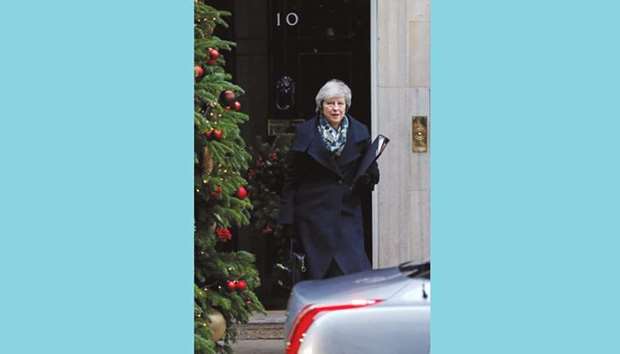The Commons will vote on Theresa May’s Brexit plan in the week starting January 14, the prime minister said, as she once again urged MPs to back her proposals, saying the alternative was no deal or no departure from the EU.
Making a statement to MPs following her difficult appearance at the EU summit in Brussels last week, May announced the date, immediately after Labour promised to push for a no-confidence vote in the prime minister if she failed to do so.
May called off the scheduled vote last week amid near-unanimous predictions she would lose, and Jeremy Corbyn was due to announce the no-confidence plan in his response to her statement.
But May instead named a tentative date for both the resumption of the debate, halted after three of its five scheduled days, and for a vote.
“It is now only just over 14 weeks until the UK leaves the EU, and I know many members of this house are concerned that we need to take a decision soon,” May said, prompting jeers from many MPs.
The leader of the Commons, Andrea Leadsom, would announce the timetable for the weeks after the Christmas recess, which begins on Thursday “in the usual way”, May said.
She added: “But I can confirm now that we intend to return to the meaningful vote debate in the week commencing January 7, and hold the vote the following week.”
The announcement nonetheless prompted angry responses from both Labour and a series of backbench MPs, who accused May of pushing the vote back to use up time, and thus create a false choice between her plan and leaving without a deal.
May insisted she had won some concessions at the Brussels summit over the vexed issue of the Irish backstop, saying: “They do not want to use this backstop. They want to agree the best possible relationship with us. There is no plot to keep us in the backstop.”
But, she added, today’s Cabinet would discuss “the next phase” in no-deal planning, in case MPs rejected her plan.
She said: “But let us not risk the jobs, services and security of the people we serve by turning our backs on an agreement with our neighbours that honours the referendum and provides for a smooth and orderly exit.”
May added: “Avoiding no deal is only possible if we can reach an agreement or if we abandon Brexit entirely.” Responding to May, Corbyn dropped his call for a no-confidence vote, briefed in advance. Instead, he accused May of seeking to make a false choice between her plan and no deal.
“The prime minister ran away from putting her deal before parliament because even her own Cabinet has doubts and she herself admits parliament won’t back it,” he said.
“So we are left edging closer to the March 29 deadline without a deal and without even an agreed plan in Cabinet to get a deal. The prime minister has cynically run down the clock trying to manoeuvre parliament into a choice between two unacceptable outcomes: her deal and no deal.”
It was, the Labour leader said, “a constitutional crisis and the prime minister is its architect”.
May’s words had seemingly little effect on her unofficial coalition partners, the DUP.
Nigel Dodds, the party’s deputy Westminster leader, said he was not reassured about the backstop. “Will the prime minister tell us exactly and precisely what she is actually asking for to deliver on the key concerns about the legally-binding and indefinite nature of the backstop with no right for this country to exit it on its own terms?” he said.
Andrew Mitchell, the Conservative former international development secretary, prompted some jeers from colleagues by asking if it might be “wiser to seek an extension to Article 50 rather than to leave with no deal?”
Another Conservative ex-minister, former education secretary Justine Greening, said: “At the moment we have no deal and no plan B. This is a constitutional crisis, because this house is not being allowed to express its will on behalf of our communities who around the country are telling us that they reject this deal.”
Other Tories such as former Brexit secretary Dominic Raab instead urged May to prepare for a no-deal departure, which he said would cause only “short-term disruption”.
Some interventions expressed open anger at the prime minister’s tactics. Labour’s Liz Kendall said: “Let me tell the prime minister what is irresponsible: delaying a vote on her agreement not because she’s going to get any changes to it but because she wants to run down the clock and try and intimidate MPs into supporting it, to avoid no deal.”

Prime Minister Theresa May leaves from 10 Downing Street in central London before heading to the House of Commons to make a statement on her attendance at last week’s EU summit.
